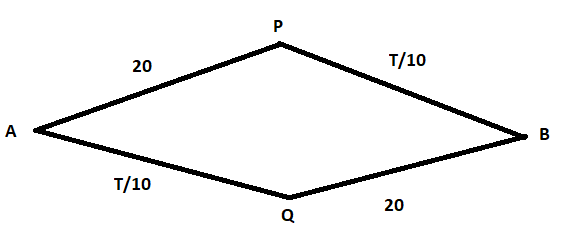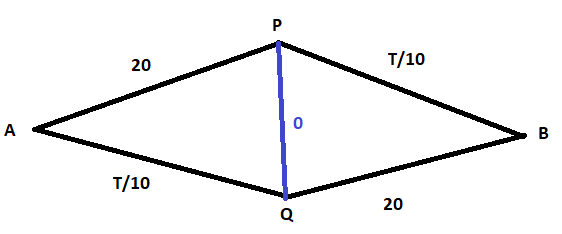-
Posts
5394 -
Joined
-
Days Won
52
Content Type
Profiles
Forums
Events
Everything posted by Genady
-
LOL. (had to google it to appreciate the joke, and learned something)
-
If you are the only car on the road, the minimum travel time is .2 minutes, by the route AQPB, isn't it? OTOH, when they get to Q, they might expect that other drivers will think this way and thus it is smart to take QPB instead. If half drivers think so, in case T=200, then 100 drivers will have total time 20+10=30, another half will have 20+20=40, with the average of 35 minutes. Like before, if they split half and half, then the average will be 35 minutes. Without the extra road, for T=200, half take APB, half take AQB, and the average is 30 minutes. Adding the road, in this case, increases the average time.
-
There are two traffic related threads going on right now, and here is a traffic related question which would've been OT in both, so I post it here. The points A and B are connected by two roads, APB and AQB. The section AP takes 20 minutes regardless of traffic. The section PB takes time equal to T/10, where T is the number of cars on the road. For example, if there are 200 cars on it, it takes 200/10 = 20 minutes. Similarly, AQ takes T/10 minutes and QB takes 20 minutes regardless of traffic. The city planners came up with an ingenious way of connecting points P and Q with a road that does not take any time at all regardless of traffic: How will it affect the average time of travel from A to B?
-
If you want to discuss your index then, I think, you better open a different thread, separately from the existence question.
-
I'm curious, which solutions you allude to.
-
No. Check relativistic velocities addition.
-
I actually try to argue that existence of mathematical objects is a model for existence of all objects.
-
I don't see a selective advantage of evolving to be 'super strong' in this situation. We'd be heavier. Perhaps this would make us to evolve to be smaller, with thicker bones and skeletal muscles, lighter and smaller heads. We'd spend more energy on holding and moving our own bodies. We'd be slower. Excess of oxygen would make us to age faster, and our lives would be shorter.
-
I think it is an electron, regardless.
-

Is the universe at least 136 billion years old, is the universe not expanding at all, did the universe begin its expansion when Hubble measured its redshift for the first time or was light twice as fast 13.5 billion years ago than it is today?
Genady replied to tmdarkmatter's topic in Astronomy and Cosmology
Correct. This is already taken in account in the Friedmann equations. -
I agree about the dogs' behavior, with a caveat that they don't have to be puppies to internalize the rules. They do it very quickly as adults when a new human master with different rules takes over. I suspect that humans do the same, when their social environment changes.
-

Is the universe at least 136 billion years old, is the universe not expanding at all, did the universe begin its expansion when Hubble measured its redshift for the first time or was light twice as fast 13.5 billion years ago than it is today?
Genady replied to tmdarkmatter's topic in Astronomy and Cosmology
Comoving with the on average homogeneous and isotropic space. How do you compare time then with time today? -
Exactly!
-
I think it is supported by facts. Here is a fact of existence, for example: For every number, a prime number exists which is greater than that number.
-

Is the universe at least 136 billion years old, is the universe not expanding at all, did the universe begin its expansion when Hubble measured its redshift for the first time or was light twice as fast 13.5 billion years ago than it is today?
Genady replied to tmdarkmatter's topic in Astronomy and Cosmology
This is the time of comoving reference frame. Slower than what? Slower than a clock which is situated away from this high density. But the entire universe was this high density. There was or is nothing away from it.



